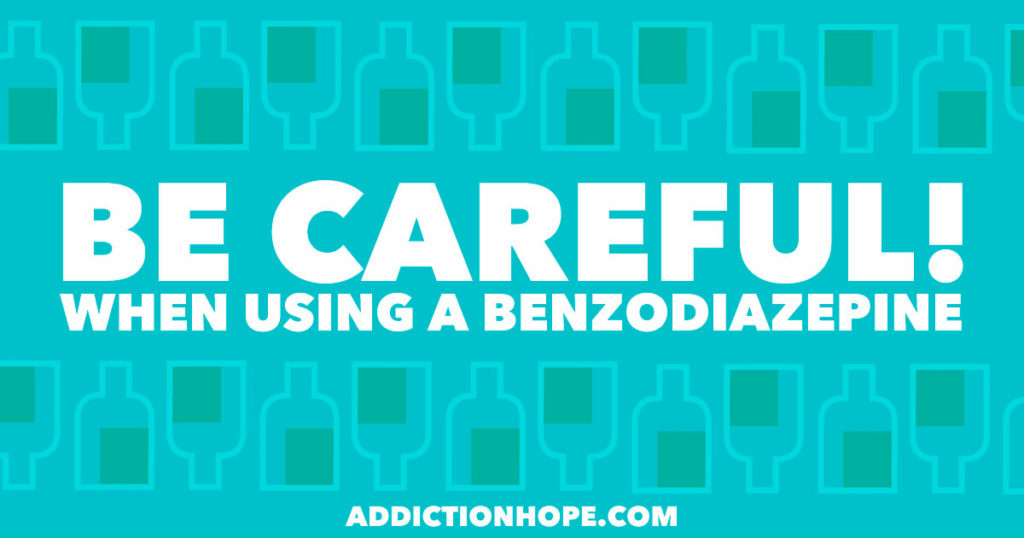
The words "addiction" and "drug use" usually make people think of alcohol, tobacco or pills. Rarely do people recognize words like benzodiazepine, except as a term on a prescription label.
You shouldn’t let the complicated name stop you from educating yourself. The more you know about benzodiazepines, the more likely you will be to recognize them, use them appropriately and avoid addiction.
What Are Benzodiazepines?
Benzodiazepines are a class of tranquilizers. You probably know them better under brand names like Valium, Xanax or Klonopin. Benzodiazepines are common treatments for anxiety associated with conditions such as:
- Panic disorder
- Insomnia
- Alcohol withdrawal symptoms
- Muscle spasms
Physicians can also use a benzodiazepine as general anesthesia for certain medical procedures. If not monitored carefully, those who use benzodiazepines to treat withdrawal symptoms can experience comorbidity – when two disorders or illnesses occur at the same time or one after another.
For a quick, visual crash course on benzodiazepines, watch this 2-minute video we’ve created:
Types Of Benzodiazepines
The type of benzodiazepine one gets prescribed depends on the patient’s symptoms. There is one form of the drug for almost any condition. Some examples are:
- If you have an anxiety disorder, your doctor may prescribe Valium, Xanax or Tranxene.
- If you suffer from seizures, your doctor might prescribe Ativan or Onfi.
- For insomnia, doctors often prescribe Dalmane or Halcion.
When prescribing a benzodiazepine, your doctor will consider how quickly the drug starts working and how quickly its effects wear off. For example, Valium and Tranxene usually start working in 30 to 60 minutes. Xanax, however, starts working immediately. For these reasons, you must be careful with dosage and frequency.
Facts About Benzodiazepines: How Dangerous Are They?
Since benzodiazepines commonly come in low doses as sedatives, some people don’t think of them as dangerous. Every drug has side effects (risks) and can be deadly if abused: Benzodiazepines are no exception. For example, people often use benzodiazepines as date rape drugs, because they lower the user’s ability to fight against sexual aggression and assault.
When taken in high doses for conditions such as anxiety, benzodiazepines can have hypnotic effects. The drug lowers natural inhibitions, which may cause users to place themselves in dangerous situations. Like most other drugs, benzodiazepines are potentially fatal when mixed with other prescriptions or alcohol.
How Common Is Benzodiazepine Dependency?
It is easy to abuse benzodiazepines and become dependent. Benzodiazepines are readily available in most doctors’ offices and pharmacies. Drug abuse is not always intentional. Overdose or abuse can happen accidentally, especially in hospitals, emergency rooms and urgent care clinics.
For these reasons, doctors must remain vigilant when prescribing or administering these drugs. They must carefully monitor each patient, adjust doses responsibly and stay in touch with patients in case new symptoms arise.
Symptoms Of Benzodiazepine Abuse And Dependency
As mentioned earlier, many people don’t set out to abuse benzodiazepines. If you suspect somebody you know is abusing these drugs, watch for symptoms including:
- Coordination problems
- Dizziness
- Confusion
- Drowsiness
- Slurred speech
In addition to these symptoms, you may notice a recurrence of the problem(s) that caused your loved one’s doctor to prescribe a benzodiazepine in the first place. Such symptoms include anxiety, insomnia or muscle weakness. In some cases, your loved one might experience severe headaches.
For someone who has used benzodiazepines to treat an eating disorder or alcohol withdrawal, some of the above symptoms may return as well. In its most severe form, benzodiazepine abuse can lead to coma or death.
If any of these symptoms or conditions applies to you or someone you know, contact your doctor immediately.
Help For Benzodiazepine Abuse
If you or a loved one has overdosed on benzodiazepines, or if you suspect an overdose, seek medical help immediately. Call 911 or go to the nearest emergency room. In the emergency department, an attending physician will assess symptoms, particularly respiration rate. The hospital will monitor heart rate, blood pressure and pulse oximetry. Oxygen may be given. You or your loved one may have to undergo a toxicology screening as well as blood or urine tests.
Emergency exams usually do not detect chronic benzodiazepine abuse. This will take more time and effort on the part of both you and your physician. Do not try to hide symptoms or the facts of your benzodiazepine usage from your doctor. He or she has seen abuse before, understands how and why it happens, and is there to help you. The doctor may refer you to a counselor or a dedicated treatment center for more specialized assistance.
If you or a loved one has a problem with benzodiazepine abuse, please seek help from a drug rehab center sooner rather than later.
